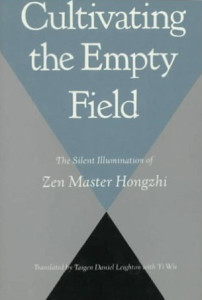Daily Dharma
Those who donated to our crowdfunding Indiegogo campaign last fall are getting daily e-mails this month as a thank-you and part of the May Sit. We wanted to share these with everyone, though they are a day or so later. This was the May 30 offering.
 The first text in italics is from Cultivating the Empty Field by Zen Master Hongzhi, translated by Taigen Daniel Leighton with Yi Wu. The commentary following it is from one of the teachers at Dharma Rain Zen Center.
The first text in italics is from Cultivating the Empty Field by Zen Master Hongzhi, translated by Taigen Daniel Leighton with Yi Wu. The commentary following it is from one of the teachers at Dharma Rain Zen Center.
When the Buddha Ancestors first appeared there were no monks and laypeople, but everybody had their own truth and position. When they intimately experienced and genuinely attained it was called entering the Buddha Mind School. Old Lu, [the Sixth Ancestor Huineng], who penetrated the dharma’s source, was a person who sold firewood. As soon as he arrived at Huangmei, [the Fifth Ancestor’s place], he said, “I want to be a buddha.” In the rice hulling room the Ancestor [Huineng] worked pounding rice until his mind mirror transcended worldly impurity, and he was thoroughly self-illuminated. He was bequeathed the ancestral robe at midnight, and crossed the Dayu Mountains. With faith in the robe he set it down. Venerable [Hui] Ming with his mighty strength could not lift it and then knew that each person must intimately experience and authentically realize for himself. So nowadays please do not acquiesce to sages and exalt their worth [instead of realizing it yourself]. This is how you should wear the robe and eat your food. When constantly mindful with no distracting considerations, minds do not allow contaminating attachments. Cast off the body of the empty kalpa; let go from the steep cliff. Comprehend your sense-object faculties until they are exhausted from top to bottom. Solitary brightness is the only illumination; extensive penetration preserves the marvel. Naturally the mind flowers and radiance shines forth, responding to the visible lands and fields. How could you have ever separated from the various permutations? Now you can enter among diverse beings and travel the bird’s way without hindrance, free at last.
Hongzhi shares with us part of the story of the Sixth Ancestor, Huineng – the sixth ancestor in the Chinese lineage. Huineng was neither the most popular nor the most conventionally successful member of the community in which he lived. Yet, through his dedication and efforts, he was recognized by his master as his successor. After his Dharma Transmission, he was advised to flee, to physically abandon his place of training, as the other monks were so jealous his life was at risk. As he traveled, one of the monks caught up with Huineng and Hongzhi describes the encounter. “With faith in the robe [Huineng] set it down. Venerable [Hui] Ming with his mighty strength could not lift it and then knew that each person much intimately experience and authentically realize for himself.” According to the Platform Sutra, Hui Ming had been chasing Huineng for months. When Huineng offered him the robe, Hui Ming replied that he no longer wanted the robe, he wanted the Dharma.
It is this dedication to seeking the Way, not for position or authority or pride, that shines through in this story that Hongzhi shares. An authentic desire to illuminate the mind and realize Truth that drives us onward in our practice. No one can do this for us. Respecting our elders and seniors on the path is worthy, but transformation is not based solely on that. Our own efforts matter. Our own resolve to let go and experience this life as it is matters. Hui Ming thought he knew what he needed when he set out to claim the robe. In his travels, he saw that illusion for what it was and met Huineng with a different perspective.
Think back to a time when you might have held different viewpoints than you do now. What changed? How did transformation happen?
